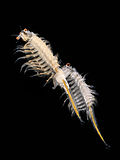Branchiopoda is a class of crustaceans. It comprises fairy shrimp, clam shrimp, Diplostraca (or Cladocera), Notostraca, the Devonian Lepidocaris and possibly...
20 KB (1,937 words) - 12:30, 8 November 2024
Anostraca is one of the four orders of crustaceans in the class Branchiopoda; its members are referred to as fairy shrimp. They live in vernal pools and...
29 KB (2,972 words) - 21:48, 6 November 2024
group to Hexapoda, and Branchiopoda is a sister group to (Remipedia + Hexapoda). Thus, their data strongly suggest that Branchiopoda is more closely related...
29 KB (1,953 words) - 20:50, 20 October 2024
pan-group referred to as Pancrustacea. The three classes Cephalocarida, Branchiopoda and Remipedia are more closely related to the hexapods than they are...
57 KB (4,897 words) - 05:46, 2 November 2024
Some have also adapted to a life in the ocean, the only members of Branchiopoda to do so, though several anostracans live in hypersaline lakes. Most...
18 KB (1,738 words) - 12:10, 7 November 2024
which abut, but have not become united, as seen in other groups of Branchiopoda. The extant members of order Notostraca composed a single family, Triopsidae...
20 KB (1,780 words) - 09:32, 11 November 2024
venomous crustaceans), Cephalocarida (translucent aquatic detrivores), and Branchiopoda (freshwater, non-decapod 'shrimp'). Newer studies also relocate copepoda...
6 KB (479 words) - 05:25, 23 August 2024
crown-group. Within the pancrustacean crown-group, only Malacostraca, Branchiopoda and Pentastomida have Cambrian fossil records. Crustacean fossils are...
131 KB (12,547 words) - 17:17, 13 November 2024
Patricio De Los Rios (2010). "The genus Artemia Leach, 1819 (Crustacea: Branchiopoda): true and false taxonomical descriptions" (PDF). Latin American Journal...
14 KB (1,519 words) - 12:18, 3 August 2024
brine shrimp – aquatic crustaceans belonging to a different class, the Branchiopoda, than the true shrimps. The name Artemia parthenogenetica is widely used...
7 KB (772 words) - 04:46, 3 August 2023










